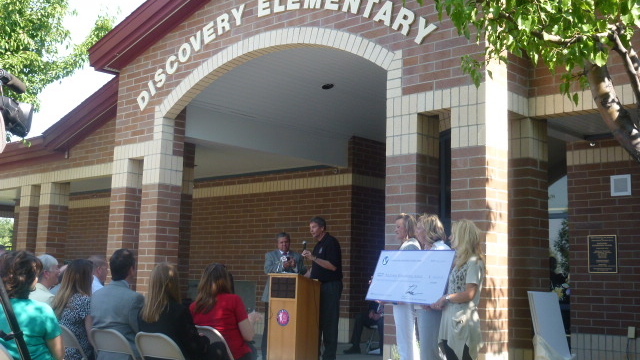On Monday, 11 Idaho schools were handed oversized checks — and a challenge.
Now that they have a share of $3 million in technology pilot money, they’re expected to deliver results, and a classroom model that can be applied in other schools.
“Let’s use this is as a catalyst,” state Superintendent of Public Instruction Tom Luna said Monday, at a ceremony honoring the grant recipients.

The winning schools serve about 5,800 students, roughly 2 percent of the state’s overall public school enrollment. The 11 grant recipients were chosen from a field of 81 schools, which submitted nearly $20 million worth of applications.
But the grant recipients are also supposed to represent a cross-section — a selection of elementary and secondary schools; urban and rural schools; and schools planning to use tablets, laptops or small laptops such as Chromebooks.
The recipients are:
- Beutler Middle School, Dayton: $138,718.74.
- Compass Public Charter School, Meridian: $180,000.
- Discovery Elementary School, Meridian: $370,501.35.
- Idaho Distance Education Academy, based in Deary: $67,754.60.
- Kuna Middle School, Kuna: $891,200.20.
- McCall-Donnelly High School, McCall: $150,000.
- Middleton High School, Middleton: $427,878.32.
- Moscow Middle School, Moscow: $180,000.
- Park Intermediate School, Weiser: $54,596.
- Parma Middle School, Parma: $83,567.59.
- Sugar Salem High School, Sugar City: $454,783.20.
Some of these schools are looking to build on programs already under way.
The McCall program, for instance, builds on a program crafted by student Brooke Thomas. As a junior, Thomas was given an iPad and an assignment: look at ways technology can be used to change the ways students “do school.”
One offshoot was a school “iClub” that encourages students to use iPads. With the $150,000 state grant, all McCall students will have access to iPads for research and note-taking. “Paper and pencil note taking is not enough for success in today’s world,” Thomas said.
Kuna Middle School, Monday’s large grant recipient, will provide Chromebooks to all of the school’s 800 students. In December, two math teachers piloted the use of Chromebooks, through a Khan Academy program funded by the J.A. and Kathryn Albertson Foundation. Within weeks, teachers in other disciplines were talking about ways they could use Chromebooks in their classes, principal Deb McGrath said.
McCall and Kuna, and the nine other sites, will test pilot programs schoolwide. The twofold goals: improved student academic growth, and improved financial efficiency.
The Legislature funded the $3 million pilot program in 2013, months after voters rejected Proposition 3, Luna’s proposal to establish a statewide laptop program in Idaho high schools. The pilot program was not without controversy; some lawmakers suggested that the grants were set up to continue an iPad pilot program at Paul Elementary School — a rural district represented by Senate Finance Committee Chairman Dean Cameron, R-Rupert, and House Speaker Scott Bedke, R-Oakley. Paul applied for a grant, but did not receive a share of the money.
Legislative leaders are hoping the $3 million in grants will create a laboratory where schools can road-test classroom technology.
“We want to grow this for our entire state,” said House Education Committee Chairman Reed DeMordaunt, R-Eagle.
More reading: Click here for an in-depth look at the selection process, and thumbnails about the 11 pilot grants.
Disclosure: Idaho Education News is funded through a grant from the J.A. and Kathryn Albertson Foundation.
